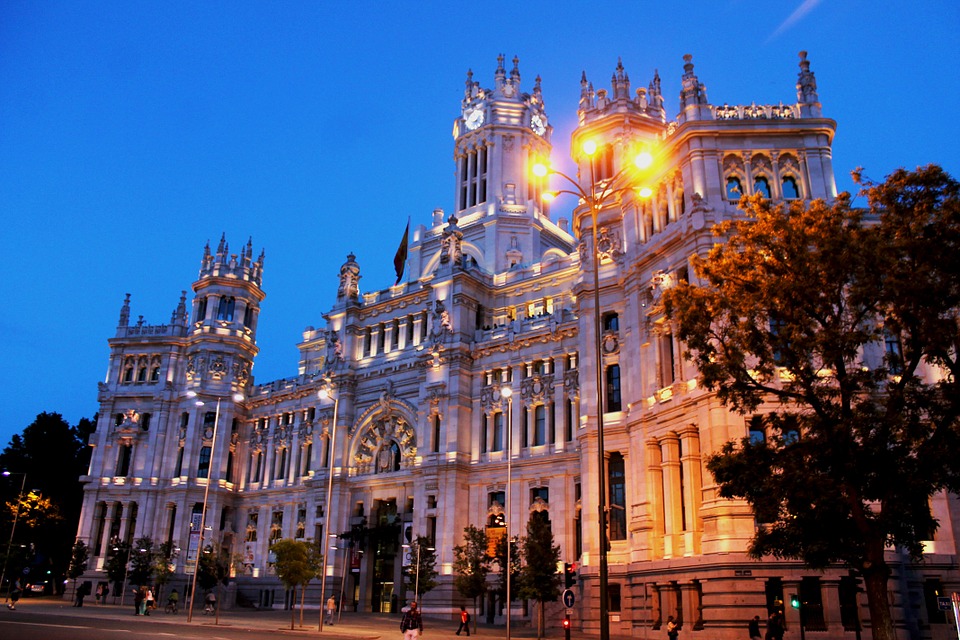For sun, sea, sand and relaxation, you could do a lot worse than moving to Spain. This gorgeous Western European country offers culture and natural beauty in spades, and is already home to a huge number of British expats.

Everything you need to know about moving to Spain
Contents
Why Move to Spain?
Perfectly sandwiched between northern Europe and Africa, Spain offers British expats the delights of good weather, beautiful beaches, rich culture and historic cities — in short, there’s something for everyone in Spain.
Moving to Spain from the UK also offers expats opportunities to travel much more widely. On the doorstep, you’ve got the parties of the Balearic Islands, the rock of Gibraltar, the souqs of Morocco and the snowy allure of the Alps.
Life is a little slower paced in Spain compared to Britain, making the country a prime retirement spot. Much emphasis is given over to good food, good drink and good company, while an afternoon siesta is almost mandatory!
Culture abounds through every corner of this country: from Gaudi’s architecture in Barcelona, the mystique of the Alhambra and the beauty of the capital, Madrid. Incredible churches and cathedrals can be found everywhere in the predominantly Catholic Spain.
There are thought to be around 320,000 British expats living in Spain as of 2016, which means that there are plenty of fellow Brits and communities of like-minded people to join.

Barcelona
Spain Visa Requirements
As the UK is currently still a member of the EU, visas are not required for people moving to Spain from the UK, although you should apply for a residency card (Tarjeta de Residencia) and foreign identity number (Número de Identidad de Extranjero) within three months of your arrival if you plan to stay long-term.
In June 2016, the British people voted to leave the EU in a referendum, which could have repercussions for Brits living in Spain. Exit negotiations are expected to take around two years, and British expats in Europe have been reassured that there will be no change to the circumstance in the meanwhile.
It’s likely that the UK government will negotiate a similar free movement of its citizens within Europe as it enjoys right now, although this is yet to be decided.
As of right now, however, the UK is still a member of the EU (and will be until exit negotiations are complete) and so Brits are able to live in Spain without needing a visa.
Way of Life in Spain
As we hinted at earlier, life is a little slower in Spain than the UK. While part of the national economy and jobs market are flagging, Spaniards and expats manage to lead a full life on Spanish shores anyway, with days revolving around the family and local communities — a common phenomena in Catholic countries. Religious festivals like Christmas and Easter are huge events in Spain.

Most people eat out regularly as prices are generally reasonable, and it’s not uncommon for a large group of friends and family to make a night of it over a wide selection of tapas and some flamenco dancing.
Spanish people are known for being sociable and relaxed, and it’s easy to make friends and date within their communities.
English is widely spoken, thanks to Spain’s status as something of a tourist hub, particularly in the popular areas frequented by Brits — Barcelona, for instance, the Costa del Sol and Majorca. Having said that, you’ll be much better equipped to settle and make friends in Spain if you make an effort to learn the language — particularly if you’re looking for a job here.
If you’d prefer to live in the more rural areas, learning Spanish is practically mandatory if you want to assimilate into your new community. While Spanish is the official language of Spain, Catalan is also spoken widely in the Northeast region, including Barcelona.
Cost of Living in Spain
With a somewhat stalling economy, you may find yourself with slightly more purchasing power after moving to Spain, provided your income and savings stay the same as they were at home.
Prices for goods, hotels and housing are generally low across the board, and you’ll be able to see why so many Brits are snapping up beautiful villas in the seaside towns once you see their prices. Even the major cities of Madrid and Barcelona are cheap in comparison to other Western European cities like London and Paris.

Ibiza
The average rent across all cities in Spain is €557 (£462) per month for a one-bed apartment in the city centre, rising to €905 (£750) for a three-bed. It’s generally assumed that property gets incrementally more expensive the closer you get to the Mediterranean coastline, as well as in the centre of Madrid and Barcelona.
The extensive coach and rail network of Spain is both cheap and reliable so a car isn’t a necessary purchase; a least not in the large urban centres. Coach tickets start from around €1.50 (£1.25) and petrol is about €1.20 (99p) a litre.
Eating out is cheap — an average of €10 (£8) a meal at an average restaurant — but groceries bought at a supermarket can conversely be quite expensive, or at least as expensive as in the UK. This explains why many locals and expats choose to eat out regularly.
Popular Areas for Brits
While Spain is a very large country, British expats tend to congregate in just a few cities and areas.
Barcelona
Often mistakenly assumed to be the capital of Spain (that’s Madrid!), Barcelona is a large city with an incredible history and character to its name.
Generally attracting younger people moving to Spain from the UK, Barcelona is a great city for people looking to work abroad or as a digital nomad, taking advantage of the low rent prices.
There’s a huge paradox in Barcelona between Spanish and Catalan influences (it’s the capital of Catalonia), as well as between modern and medieval. A very beautiful and exciting city to live in, and probably the most fast-paced area of Spain.
Madrid
The capital isn’t quite as popular as Barcelona when it comes to attracting British expats, but it nonetheless is a great place to live, slap bang in the middle of the country.

If you’re looking for a job in Spain, Madrid is the city to do that with the fastest growing jobs economy (although it’s still pretty slow by most Western standards). Like Barcelona, history and culture sit alongside the delights of a modern metropolis.
Costa del Sol
With gorgeous beaches, low cost housing and a Mediterranean climate, it’s no wonder that so many people choose to move to the Costa del Sol from the UK. ‘Costa del Sol’ literally translates to the Sun Coast!
It’s particularly popular with British retirees looking for some sun, but young families and singletons aren’t unheard of either.
Malaga is the major airport providing access to the Costa del Sol, and there are plenty of low-cost airlines serving the area. You’re also very close to Portugal and Africa down in this Southern Spain spot if you need anymore sun and sea.
Majorca

Majorca — or Mallorca — is the largest of the Balearic Islands off the coast of the Iberian peninsula.
Again, this is island living for people after sun, sea and a slow pace of life; and there’s a large British community of expats enjoying that.
Thanks to the cracking Mediterranean location, there are plenty of opportunities for sailing and yachting; perfect for Brits after a life on the water!
British Communities in Spain
There are so many people moving to Spain from the UK that you’ll likely have no problem finding fellow Brits and making new friends.

There are plenty of Brits in Malaga
If you do need a helping hand, however, there are plenty of online resources for British expats in Spain. Here are some of the best:
- Expatica Spain
- Spain Expat
- Ideal Spain
- InterNations Spain
- Expat Focus Spain Forum
- Eye On Spain
- Two Brits in Spain
- Oh Hello, Spain
Spain Essentials
Jobs Economy
Finding a job in Spain is difficult for many expats, and indeed, many locals as the national economy is quite sluggish. Companies are likely to hire a Spanish national over a British expat if the two are similarly qualified and there’s just one position on offer.
There are a number of multinationals operating in Madrid and Barcelona so it’s definitely worth inquiring about openings with British companies who have Spanish offices. While most positions in Spain will require at least a high level of conversational Spanish, international companies are likely to be more flexible towards a native English speaker.

A lot of people moving to Spain from the UK are able to find work as English tutors for Spanish children, and many people choose to make their living online — ideal for anyone without the requisite Spanish language ability for office work.
Healthcare
The healthcare system in Spain is of a very high standard, with a wide array of both public and private facilities.
You should sign up for the European Health Insurance Card (EHIC), if you don’t have one already, which entitles British citizens to free primary health care (essentially, emergency medical treatment) for the first three months of your stay, as long as you’re not yet a Spanish resident.
After that period, you will need to either take out private health insurance, or start paying into the social security system (seguridad social) to access free health care from the public system. Many employers will sign you up to this scheme with your employment package.
If you’re planning on retiring to Spain, you should make plans for old age before you are still physically and mentally able to. This article outlines the options for Spanish nursing homes and care facilities.
Bringing Kids to Spain
There are plenty of schools in Spain across the public, private and international spectrum, from nursery age all the way through university, and are generally considered to be of high quality.
It is free for expats to send their children to Spanish state schools, although they will need to be registered on the Padron/Empadronamiento at your local town hall beforehand.

Aside from the British international schools which teach in English and follow the British or International Baccalaureate curriculum, schools in Spain will be taught in Spanish.
While that might be preferred for very young children getting to grips with Spanish, or those already fluent in the language, older children may be best admitted to an international school (although be mindful that these can be very expensive).
A large proportion of public and private schools in Spain will follow Catholic principles, including time for prayer, which may be of concern depending on your family’s own religious inclinations.
Thanks to the huge number of Brits living in Spain, there are a large communities of parents with kids who’ll be able to offer advice on good schools as well as assimilation and extra-curricular activities.



